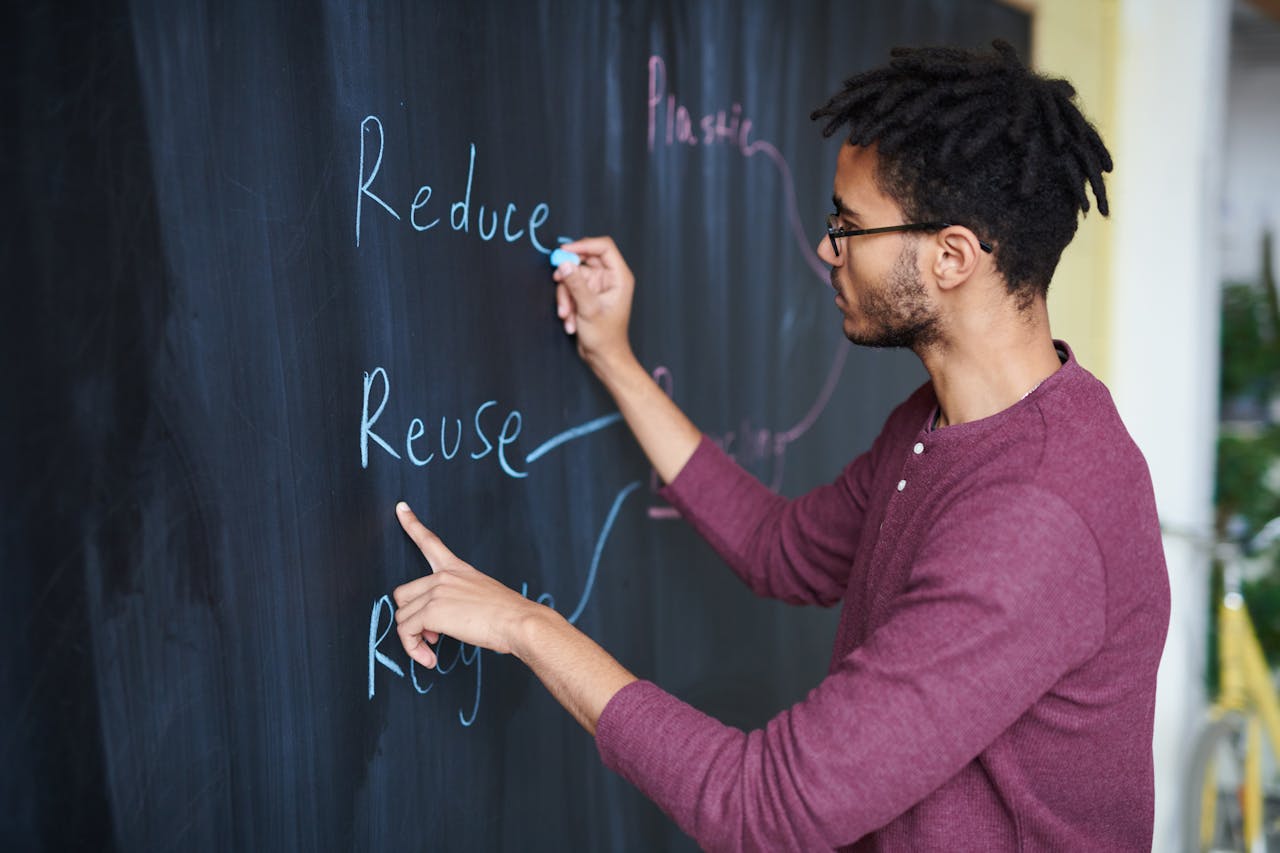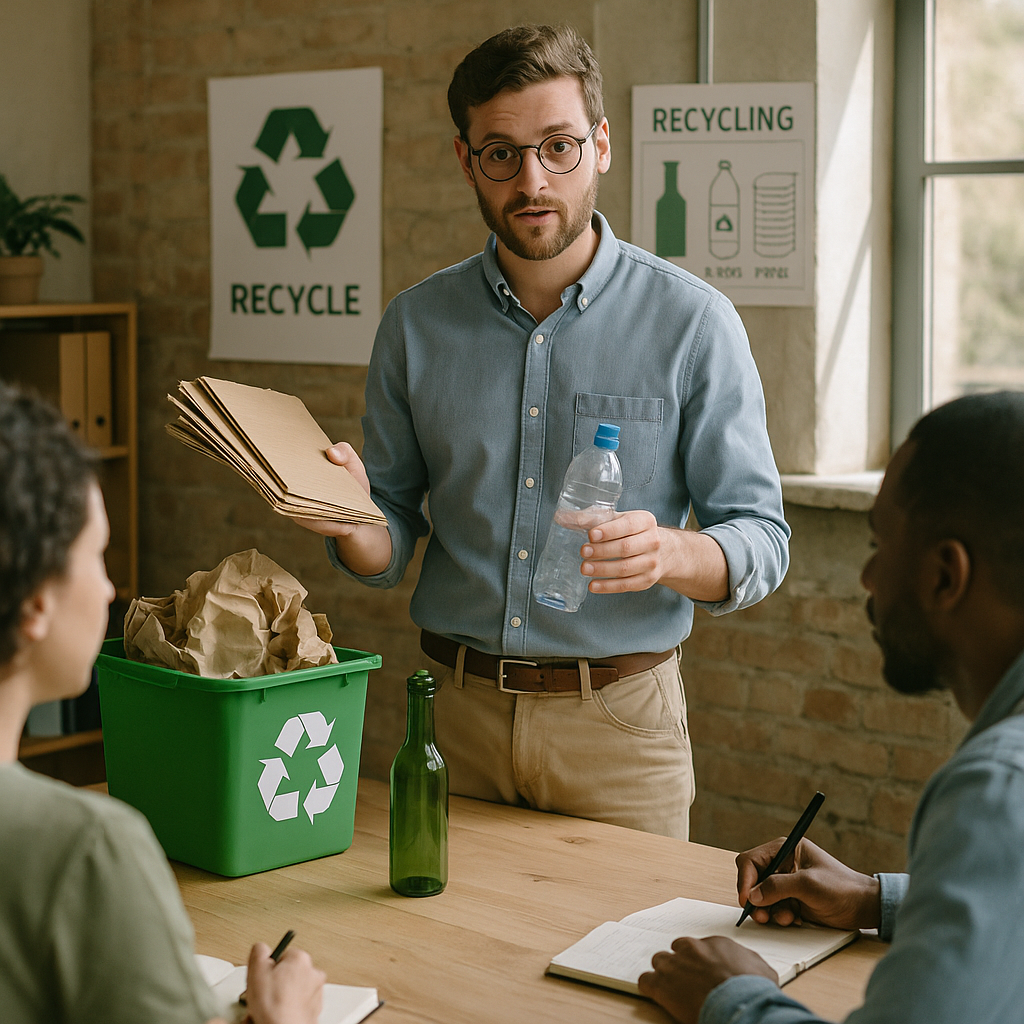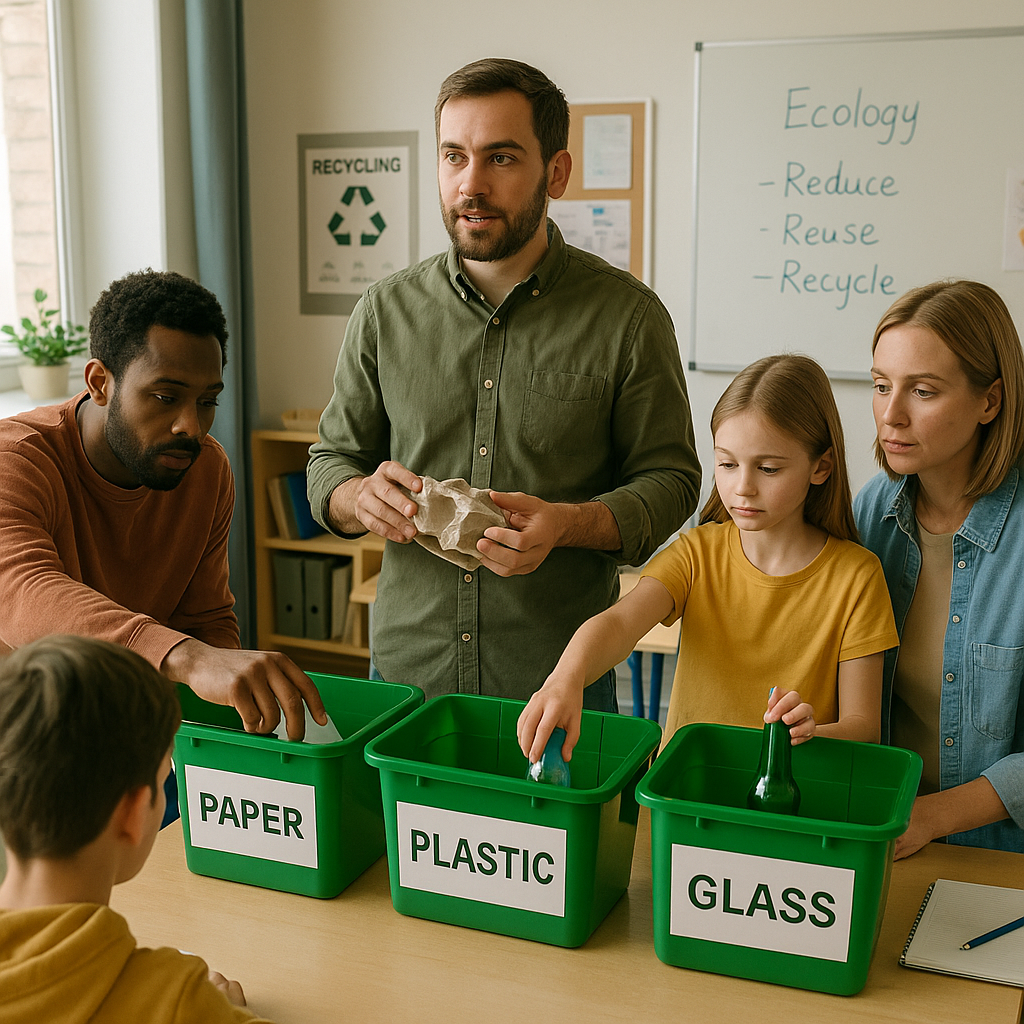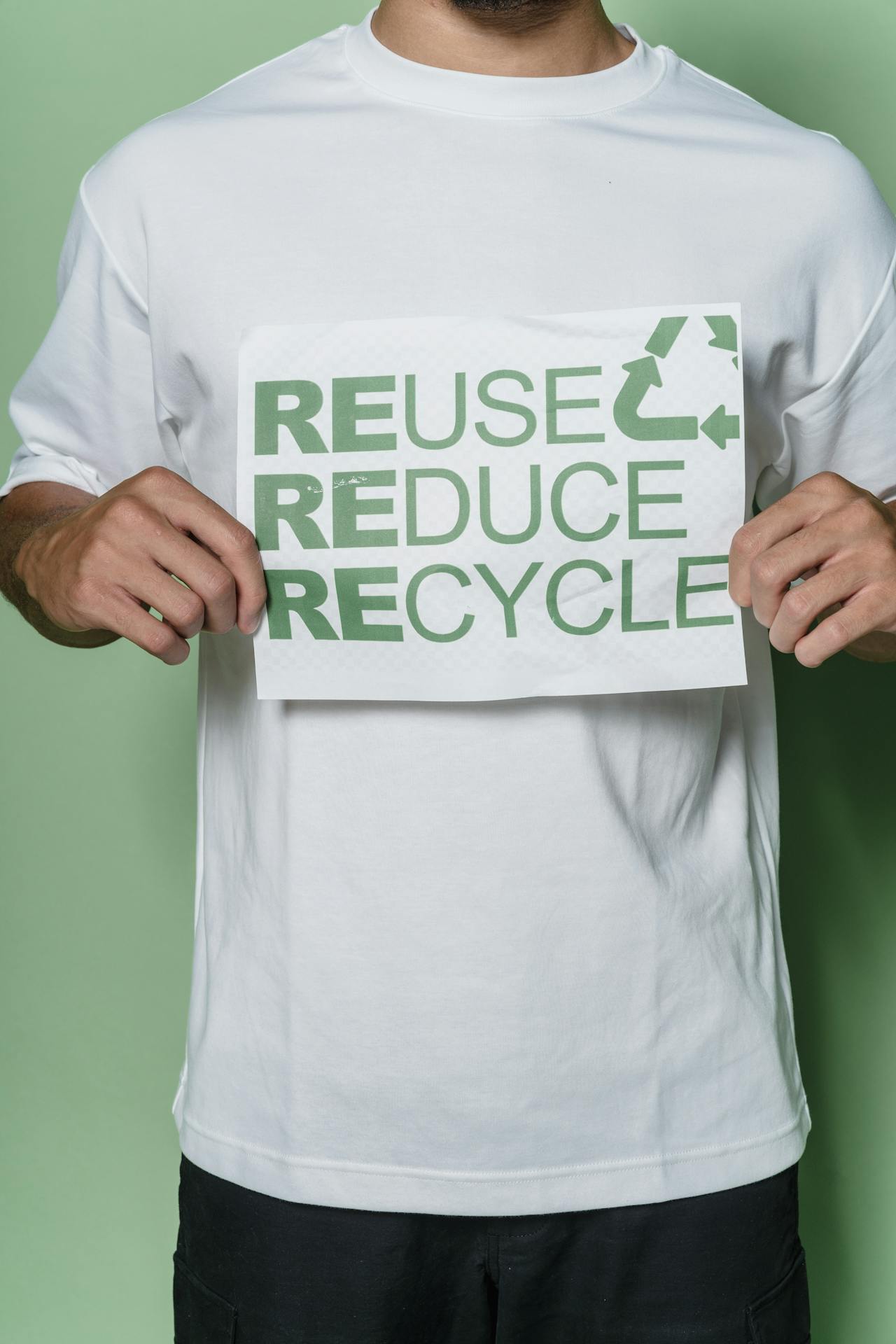5901 Botham Jean Blvd, Dallas, TX 75215
What are Educational Workshops on Recycling?
June 22, 2025Did you know that proper recycling education can boost community recycling rates by up to 30% in just six months? This impressive statistic underscores the significant impact that focused learning can have on our environmental practices.
Educational workshops on recycling are structured programs designed to inform and educate various groups about waste reduction, recycling processes, and resource management. These interactive sessions provide practical knowledge on proper waste sorting techniques and the environmental benefits of reducing landfill waste. The workshops are tailored to accommodate different age groups and knowledge levels, with sessions ranging from 30 to 60 minutes.
These educational initiatives are vital tools for communities working toward sustainability goals. By focusing on hands-on learning activities and clear information about local recycling guidelines, these workshops help bridge the knowledge gap that often hinders effective recycling practices. Whether delivered in schools, community centers, or workplaces, recycling workshops lay the foundation for lasting environmental stewardship in communities of all sizes.
Who Can Benefit from Recycling Education Programs?

Recycling education programs cater to a wide audience. Their adaptable nature makes them valuable for diverse groups seeking to improve their environmental impact through better waste management practices. These programs are designed to be inclusive, allowing customization based on participants’ specific needs, interests, and knowledge levels.
Educational initiatives focused on recycling provide tangible benefits to communities by raising awareness about proper waste sorting, reducing contamination in recycling streams, and fostering environmental stewardship. Research from The Recycling Partnership shows that consistent education can significantly improve recycling participation and effectiveness across different demographic groups.
- Schools and Educational Institutions – Programs can be tailored with age-appropriate activities, such as recycling sorting games for elementary students or waste audit projects for high schoolers. These initiatives help instill sustainable habits early.
- Civic Groups and Community Organizations – These programs can focus on local recycling infrastructure and community-specific challenges. For example, a neighborhood association might benefit from workshops addressing common recycling contamination issues in their area.
- Senior Centers – Workshops can be adapted with larger print materials and practical demonstrations focusing on common household items. Sessions might include discussions about how recycling practices have evolved over time.
- Religious Organizations – Programs can connect environmental stewardship with values of community care and responsibility. These workshops might emphasize reducing waste at community events or implementing recycling systems within the facility.
- Workplace and Employee Groups – Corporate-focused programs can address office-specific recycling challenges and opportunities for reducing business waste. These might include strategies for paperless operations or proper disposal of technology.
- Residential Complexes and Homeowners Associations – These workshops can address challenges specific to multi-unit housing, such as communal bin contamination or space constraints for recycling storage.
- Non-profit and Environmental Organizations – Programs can provide advanced training for volunteers who can then become community educators themselves, creating a multiplier effect in spreading recycling knowledge.
Case studies from communities with comprehensive recycling education show significant improvements in recycling rates. For instance, a condo association in Washington D.C. reduced contamination rates from 33% to 11% after implementing targeted educational initiatives for residents. This demonstrates the practical value these programs bring to participating groups.
The flexibility of recycling education allows for addressing specific challenges faced by different community segments. For example, a workshop for a senior center might focus on identifying recyclable packaging and managing medication containers safely, while a school program might emphasize creative reuse projects and the environmental impact of single-use items.
What Topics are Covered in Recycling Workshops?

Recycling workshops offer comprehensive education on proper waste management practices. They typically begin with the fundamentals of sorting recyclables. Participants learn to identify different materials and place them in appropriate collection bins, which helps reduce contamination in recycling streams.
Waste reduction strategies are a core component of these workshops. Attendees discover practical ways to minimize waste generation at home and in businesses, such as shopping mindfully and choosing products with less packaging. Many workshops incorporate the concept of ‘waste leakage’ to illustrate how improper recycling practices contribute to environmental pollution.
Composting is often a popular workshop topic. Participants learn to transform organic waste like food scraps and yard trimmings into nutrient-rich soil. Workshops often include hands-on demonstrations of both backyard composting systems and worm composting methods, helping divert significant portions of household waste from landfills.
Resource management education helps participants understand the broader implications of recycling. Workshops explain how recycling conserves natural resources and reduces energy consumption, often highlighting the connection between waste management and climate change mitigation efforts.
Zero-waste living principles represent more advanced workshop content. Attendees learn strategies for eliminating waste entirely through careful consumption, reuse, and repair practices. These sessions often feature real-world examples from individuals who have dramatically reduced their waste output.
Workshops frequently incorporate circular economy concepts. This approach reimagines traditional linear consumption patterns in favor of systems that keep materials in use. Participants discover how products can be designed for longevity, repair, remanufacturing, and eventual recycling.
Community engagement strategies provide practical tools for spreading sustainable practices. Workshops teach participants how to organize neighborhood recycling drives or implement recycling programs in schools and workplaces, emphasizing collaboration and shared responsibility.
| Experience Level | Workshop Topics | Focus Areas |
|---|---|---|
| Beginner | Recycling Basics | Proper sorting techniques, identifying recyclable materials, understanding local guidelines |
| Beginner | Waste Reduction Fundamentals | Simple strategies to minimize waste, shopping mindfully, reducing packaging |
| Intermediate | Composting | Backyard composting systems, worm composting, transforming organic waste |
| Intermediate | Resource Management | Conservation of natural resources, energy consumption reduction, climate change connections |
| Advanced | Zero-Waste Living | Eliminating waste through consumption habits, reuse strategies, repair practices |
| Advanced | Circular Economy Concepts | Redesigning consumption patterns, product longevity, remanufacturing |
| Advanced | Material-Specific Recycling | Electronics recycling, hazardous waste disposal, textile recycling |
Material-specific recycling instruction delivers specialized knowledge about handling challenging items. Workshops may focus on electronics recycling, hazardous waste disposal, or textile recycling. These sessions address common confusion points and highlight specialized recycling facilities.
Environmental impact assessment helps participants understand the consequences of waste management decisions. Workshops often present data on landfill capacity, ocean pollution, and greenhouse gas emissions, providing powerful motivation for recycling and waste reduction efforts.
How are Recycling Workshops Delivered?
Online Workshop Delivery
Online recycling workshops have become popular due to their convenience and flexibility. These virtual environments allow participants to access educational content from anywhere with an internet connection. Many waste management organizations now offer comprehensive modules that can be completed at the learner’s own pace.
The digital format enables facilitators to incorporate interactive elements like quizzes, videos, and simulations that enhance the learning experience. Online workshops also reduce the carbon footprint associated with travel to physical locations, aligning with broader sustainability goals.
The main limitation of virtual workshops is the reduced hands-on experience. Despite this, online platforms often compensate with detailed visual demonstrations and supplementary resources that participants can download for reference.
Onsite Workshop Methods
Face-to-face recycling workshops offer a more immersive educational experience. These onsite presentations allow participants to physically interact with recyclable materials and sorting equipment. Direct engagement helps reinforce proper waste management techniques through practical application.
Onsite workshops foster stronger community connections among participants who share similar recycling interests or challenges. These in-person events create opportunities for spontaneous questions and discussions that can address specific local recycling concerns.
The logistics of organizing physical workshops can be more complex than their online counterparts. Factors like venue selection, equipment transportation, and attendance limitations must be carefully considered. However, these challenges are often outweighed by the impact of direct experiential learning.
Blended Learning Approaches
Many successful recycling education programs implement a hybrid model that combines both delivery methods. This approach maximizes the benefits of online convenience while preserving hands-on learning opportunities. Participants might complete foundational learning online before attending a shortened in-person session focused on practical application.
Holistic waste management training programs, like those referenced by the European Demolition Organization, often utilize blended approaches when addressing complex topics such as construction waste recycling. The theoretical frameworks are delivered digitally while site-specific recycling techniques are demonstrated in person.
Finding local recycling workshops has become easier through municipal websites and sustainability organizations. Most county waste management departments maintain calendars of upcoming educational events. Environmental non-profits frequently partner with local governments to expand the reach of their recycling education initiatives.
What are the Goals of Recycling Education Initiatives?

Recycling education initiatives aim to transform how communities manage waste and protect natural resources. The primary goal is to create an environmentally conscious society that understands the benefits of proper waste management. Through targeted instruction, educators increase public awareness about waste reduction strategies and develop sustainable habits.
Many organizations set ambitious targets for their efforts. Waste Hero Education, for example, aims to educate 1 million people by 2030 on sustainability concepts, including recycling fundamentals and circular economy frameworks. These targets help track progress and ensure accountability. Rather than promoting recycling as an isolated activity, these initiatives present it as part of a comprehensive approach to environmental stewardship.
Regulatory compliance is another objective of recycling education. Programs often align with government mandates for educational outreach. California’s SB 1383, for instance, requires education on organics recycling to reduce landfill methane emissions. Effective programs help municipalities avoid fines while advancing environmental goals, ensuring education reaches all sectors of society.
Recycling education also aims to correct misconceptions that hinder effective practices. Programs target contamination reduction by teaching proper sorting and material identification. Clean recycling streams enhance economic viability and resource recovery. Understanding proper sorting makes the recycling system more efficient and cost-effective.
Importantly, these initiatives strive to change how people view waste. Rather than just putting items in a blue bin, programs promote understanding of material lifecycles. This holistic approach helps recognize discarded items as valuable resources. Such shifts in perception drive behavioral changes that extend to broader sustainable consumption patterns.
Conclusion: The Impact of Educational Workshops on Recycling

Educational workshops on recycling have become effective catalysts for environmental change. These programs equip communities with the knowledge and tools needed to make informed waste management decisions. By offering accessible learning opportunities tailored to various age groups and backgrounds, recycling workshops lay the groundwork for lasting behavioral change.
The real value of these educational initiatives is their ability to translate abstract environmental concepts into practical, everyday actions. Communities involved in recycling workshops often exhibit increased recycling rates, reduced contamination in recycling streams, and greater overall engagement in sustainability practices. These workshops also strengthen community connections, uniting people around the shared goal of environmental stewardship.
Whether you aim to enhance your organization’s sustainability practices or simply wish to reduce your environmental footprint at home, contact Okon Recycling at 214-717-4083. Our team provides comprehensive recycling solutions tailored to your specific needs. Together, we can build a cleaner, more sustainable future.
